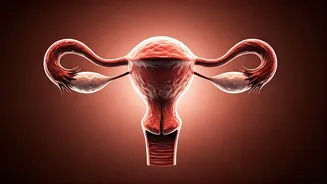Stress's Grip Explained
Stress, a common experience in modern life, significantly impacts women's reproductive health. The body's response to stress involves the activation of
the hypothalamic-pituitary-adrenal (HPA) axis, leading to the release of hormones like cortisol. Chronically elevated cortisol levels can disrupt the delicate balance of hormones essential for reproductive functions. These hormonal imbalances may then interfere with the menstrual cycle, potentially causing irregular periods, intensified premenstrual syndrome (PMS) symptoms, and, in severe cases, the cessation of menstruation (amenorrhea). Furthermore, prolonged stress can compromise the immune system, making women more vulnerable to reproductive health issues. This interconnectedness underscores the importance of stress management for maintaining optimal reproductive well-being.
Hormones Under Pressure
The menstrual cycle, a hallmark of women's reproductive health, is intricately regulated by hormonal fluctuations. Stress can wreak havoc on this delicate system, particularly by influencing the levels of key hormones such as estrogen and progesterone. Estrogen plays a crucial role in the development and maintenance of female reproductive tissues. Elevated stress can lead to lower estrogen levels, which may result in irregular menstrual cycles, reduced fertility, and even mood swings. Progesterone, essential for preparing the uterine lining for pregnancy, is also sensitive to stress. Stress can disrupt progesterone production, creating difficulties in conceiving. The imbalance induced by stress can therefore impact many facets of reproductive health, underscoring the necessity of adopting effective stress-reducing strategies.
Stress & Gynecological Health
Beyond hormonal imbalances, stress can also directly affect gynecological health. Chronic stress may worsen the symptoms of conditions like polycystic ovary syndrome (PCOS), a hormonal disorder that often causes irregular periods, ovarian cysts, and other complications. Stress can also amplify the discomfort of conditions like endometriosis, characterized by the growth of uterine-like tissue outside the uterus. These conditions can significantly affect a woman's quality of life, increasing both physical pain and emotional distress. Stress can also weaken the immune system, making the body more susceptible to infections. Women may experience recurring yeast infections or bacterial vaginosis, adding to the health challenges related to stress. Therefore, managing stress is crucial not just for hormonal balance but also for directly supporting overall gynecological wellness and minimizing the impact of these health issues.
Effective Stress Management
Fortunately, there are various evidence-based strategies to manage stress and its impact on women's health. Regular exercise is highly beneficial, as physical activity releases endorphins, which have mood-boosting effects and can reduce stress hormones. Practicing mindfulness and meditation helps develop awareness of the present moment, which enables individuals to detach from stressful thoughts and emotions. Deep breathing exercises can also calm the nervous system. Creating a balanced lifestyle, including proper sleep, a nutritious diet, and strong social support, is essential. Prioritizing self-care and engaging in enjoyable activities offers respite from daily stressors. Seeking professional help through therapy or counseling provides tools and support for navigating stress effectively and maintaining both mental and physical health. Combining these strategies creates a comprehensive approach to stress management, promoting a healthier reproductive system.
Making Positive Changes
Implementing stress-reduction techniques can significantly improve gynecological health and overall well-being. Consistent exercise boosts both physical and mental resilience. Mindfulness and meditation cultivate a calm state of mind, facilitating better emotional regulation. Dietary improvements and adequate sleep provide a solid foundation for optimal hormonal balance. Developing strong social connections reduces feelings of isolation and provides emotional support. Prioritizing self-care activities, such as hobbies or spending time in nature, boosts mental well-being. Women can integrate these strategies into their daily lives to manage stress effectively and promote better health. By making these changes, individuals can foster better health and enhance the overall quality of life.














